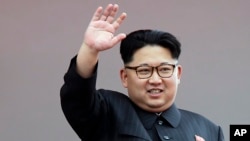U.S. allies in East Asia on Thursday welcomed the incrementally tougher sanctions imposed on North Korea by the United Nations Security Council, but few in the region expect these new measures to deter the Kim Jong Un government.
Japanese Prime Minster Shinzo Abe put out a statement of support for the new council resolution saying it, “reflects the international community’s intention to take tough measures that are in a completely different dimension from past ones.”
The South Korean government urged North Korea to heed the international community’s warning to halt its nuclear program or face further consequences.
“It will not only face more economic difficulties and diplomatic isolation, but it would also see its rights and privileges as a member of the U.N. suspended,” said Foreign Ministry spokesman Cho June-hyuck.
The South Korean government also announced it would impose additional unilateral sanctions as well.
Fifth nuclear test
The Security Council has imposed several rounds of increasingly harsh, targeted sanctions on North Korea since 2006. Diplomats said the measures have slowed North Korea’s march toward a nuclear weapon, but have so far failed to induce Pyongyang to abandon its atomic ambitions.
This new round of economic sanctions, imposed against North Korea for its fifth nuclear test conducted September 9, was unanimously endorsed by the 15 members of the council that includes Pyongyang’s key allies China and Russia.
The latest measures seek to further tighten past restrictions and include:
- Caps on the country’s coal exports and expanding a mineral trade ban that could deprive the Kim government of an estimated $800 million a year in revenue.
- Additional financial restrictions, requiring foreign banks to cease operations inside North Korea and mandating the expulsion of North Korean financial officials from outside countries.
- Blacklisting 11 more North Korean officials and 10 more organizations suspected of involvement in the country’s nuclear program, conventional arms trade or coal sector.
- Prohibitions on the sale of new vessels and helicopters to North Korea and requiring other U.N. members to deflag any North Korean vessels that are registered in their countries.
Nuclear state
Kim has declared North Korea a nuclear power, but said it would only use these weapons of mass destruction if national sovereignty is threatened by “invasive hostile forces with nuclear weapons.”
Pyongyang reacted defiantly to the last round of U.N. sanctions imposed in March, by accelerating weapons development efforts, conducting 20 missiles tests and an unprecedented second nuclear test in one year.
Past sanctions have been effective in reducing international trade and investment in North Korea, suspending currency transfers to North Korean banks, and increasing inspections of North Korean vessels.
But at the same time, the price of food and fuel have been unaffected by past trade restrictions and there are indications the leadership has not been seriously impacted.
“There are a number of mechanisms in place also to insulate the regime, the leadership from those sanctions. So they don’t bear the cost personally and that’s a problem with changing the behavior,” said Daniel Pinkston, a Northeast Asia analyst and lecturer in international relations with Troy University in Seoul.
China
Beijing’s enforcement of U.N. Resolution 2321, adopted Wednesday, continues to be crucial as 90 percent of North Korean trade flows either to or through China.
“Resolution 2321 is meaningful to supplement previous resolutions, but I am skeptical about its effectiveness considering the dynamics in the international community,” said Woo Su-keun, a professor of international relations at Donghua University in Shanghai.
China reportedly imported more than 18 million tons of coal from North Korea this year, 13 percent more than in 2015. Under the new sanctions, Beijing will have to limit its coal imports from its ally to 1 million tons for December.
Beijing had reportedly been reluctant to support stronger sanctions that might cause the collapse of the Kim government, which it sees as a needed buffer to prevent the U.S. and South Korea from expanding their power and presence on the peninsula.
“It appears China has shown sincerity, although it did not meet the expectation of the international community,” said Chung Sung-yoon, a researcher at the Korea Institute for National Unification in Seoul.
Beijing has also been critical of the U.S. and South Korea joint decision to deploy the THAAD missile defense shield, which it sees as an unnecessary provocation that could be used against China.
The situation in the region could become more tense when the administration of U.S. President-elect Donald Trump takes over in January. During his campaign for the presidency, Trump talked about pressuring China to compel the Kim government to halt its nuclear program.
Youmi Kim and Han Sang-mi in Seoul contributed to this report.





